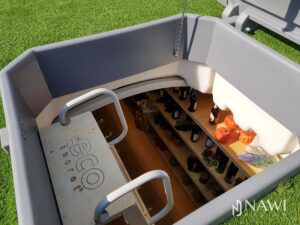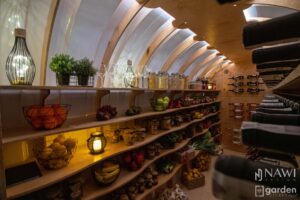
Optimal cellar temperature for stored products
Lead:
The right temperature in the basement is a key factor in the long-term quality and shelf life of stored products. Do you know what the optimal temperature is in the cellar for different types of food, wines, and other things? In this comprehensive article on the optimal basement temperature, you’ll find out why it’s so important, what products are best stored in the cellar, and what temperature conditions you should provide to keep them fresh for longer.
Introduction
Cellars, once used primarily as a place to store food and other supplies, today often serve a variety of functions. They can be used as a storage space for wines, a collection of books, or even as an additional living room. Regardless of the purpose of your basement, temperature is a key factor in the shelf life of the products stored there.
In this article, we will focus on the question: what is the optimal temperature in the basement for stored products? The answer to this question may vary depending on the type of products you store, but there are some general guidelines that you should be aware of in order to maintain their quality for longer.
Why does temperature matter?
Temperature plays a key role in the degradation process of many products. Inadequate temperature can accelerate chemical decomposition processes, leading to loss of nutrition, flavor, and texture. In the case of food, it can also promote the proliferation of microorganisms, which in turn can lead to spoilage of products and the risk of food poisoning.
The optimal temperature in the basement ensures stable storage conditions that help to preserve the quality of the products for a long time. This is especially true if you want to store food for stock or collect wine.
Optimal cellar temperature for different types of products
- Food
a. Fruits and vegetables: The optimal temperature for storing most fruits and vegetables is around 0-4°C. This low temperature helps to slow down the ripening process and keep the produce fresh. However, some vegetables, such as potatoes and onions, are best stored at slightly higher temperatures, around 7-10°C.
b. Milk and dairy products: The storage temperature for milk and dairy products should be around 1-4°C. Higher temperatures can accelerate the souring and spoilage process of milk.
c. Meat: Meat, whether raw or cooked, is best stored at a temperature close to zero degrees Celsius. This temperature helps to preserve freshness and prevents bacterial growth.
d. Cereal products: It’s a good idea to store cereal products such as flour, rice and pasta at a temperature close to 20°C. It’s also important to keep humidity low to avoid mold and quality degradation.
- Wine
a. Red wine: Red wine is best stored at a temperature between 12°C and 18°C, which allows the wine to mature evenly and develop its full flavor.
b. White wine: White wine is more delicate than red wine and should be stored at a lower temperature, usually between 7°C and 13°C. This helps to preserve its freshness and acidity.
c. Champagne and sparkling wines: These wines are best stored at lower temperatures, around 5-10°C, to avoid loss of bubbles and flavor.
- Other Products
a. Collections of books and documents: If you store valuable books, documents, or other items in your basement, the temperature should be constant and controlled, ideally between 15°C and 21°C. Low humidity is also key to prevent the paper from deteriorating.
b. Electronics: If you keep electronic devices in your basement, it is important that the temperature does not drop below 10°C to avoid damaging the electronic components.
Basement Temperature Range
As already mentioned, the optimal temperature in the basement can vary depending on the type of products being stored. Nevertheless, there is a temperature range that can be considered safe and suitable for storing a wide variety of things.
In general, the temperature in the basement should be between 0°C and 21°C. This is a wide range that allows you to store both food and other things. However, it is worth remembering that the lower the temperature, the longer you can store food and other products.
Conclusion
The right temperature in the basement is a key factor in the shelf life of stored products. The optimal temperature varies depending on the type of food you’re storing, but generally speaking, it’s a good idea to keep the temperature between 0°C and 21°C to maintain the quality and freshness of your stored items.
Keep in mind that humidity is also an important factor. Low humidity can lead to dryness and damage to some products, while excessive humidity can promote mold and bacteria growth. That’s why it’s worth investing in proper humidity control if you want to ensure the long-term sustainability of your inventory.
It’s also a good idea to regularly monitor the temperature and humidity in your basement to make sure they’re kept in the right conditions. As a result, you will be able to enjoy the freshness of your food, the full flavor of your wine, and the shelf life of other stored products for years to come.




